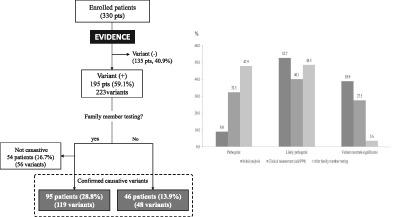当前位置:
X-MOL 学术
›
Clin. Genet.
›
论文详情
Our official English website, www.x-mol.net, welcomes your
feedback! (Note: you will need to create a separate account there.)
Diagnostic yield and clinical utility of whole exome sequencing using an automated variant prioritization system, EVIDENCE.
Clinical Genetics ( IF 2.9 ) Pub Date : 2020-09-09 , DOI: 10.1111/cge.13848 Go Hun Seo 1 , Taeho Kim 2 , In Hee Choi 3 , Jung-Young Park 1 , Jungsul Lee 1 , Sehwan Kim 1 , Dhong-Gun Won 1 , Arum Oh 4 , Yena Lee 4 , Jeongmin Choi 2 , Hajeong Lee 5 , Hee Gyung Kang 6 , Hee Yeon Cho 7 , Min Hyun Cho 8 , Yoon Jeon Kim 9 , Young Hee Yoon 9 , Baik-Lin Eun 10 , Robert J Desnick 11 , Changwon Keum 1 , Beom Hee Lee 3, 4
Clinical Genetics ( IF 2.9 ) Pub Date : 2020-09-09 , DOI: 10.1111/cge.13848 Go Hun Seo 1 , Taeho Kim 2 , In Hee Choi 3 , Jung-Young Park 1 , Jungsul Lee 1 , Sehwan Kim 1 , Dhong-Gun Won 1 , Arum Oh 4 , Yena Lee 4 , Jeongmin Choi 2 , Hajeong Lee 5 , Hee Gyung Kang 6 , Hee Yeon Cho 7 , Min Hyun Cho 8 , Yoon Jeon Kim 9 , Young Hee Yoon 9 , Baik-Lin Eun 10 , Robert J Desnick 11 , Changwon Keum 1 , Beom Hee Lee 3, 4
Affiliation

|
EVIDENCE, an automated variant prioritization system, has been developed to facilitate whole exome sequencing analyses. This study investigated the diagnostic yield of EVIDENCE in patients with suspected genetic disorders. DNA from 330 probands (age range, 0‐68 years) with suspected genetic disorders were subjected to whole exome sequencing. Candidate variants were identified by EVIDENCE and confirmed by testing family members and/or clinical reassessments. EVIDENCE reported a total 228 variants in 200 (60.6%) of the 330 probands. The average number of organs involved per patient was 4.5 ± 5.0. After clinical reassessment and/or family member testing, 167 variants were identified in 141 probands (42.7%), including 105 novel variants. These variants were confirmed as being responsible for 121 genetic disorders. A total of 103 (61.7%) of the 167 variants in 95 patients were classified as pathogenic or probably to be pathogenic before, and 161 (96.4%) variants in 137 patients (41.5%) after, clinical assessment and/or family member testing. Factor associated with a variant being regarded as causative includes similar symptom scores of a gene variant to the phenotype of the patient. This new, automated variant interpretation system facilitated the diagnosis of various genetic diseases with a 42.7% diagnostic yield.
中文翻译:

使用自动变异优先排序系统 EVIDENCE 进行全外显子组测序的诊断率和临床效用。
EVIDENCE 是一种自动变体优先排序系统,旨在促进整个外显子组测序分析。本研究调查了 EVIDENCE 在疑似遗传疾病患者中的诊断率。来自 330 名疑似遗传疾病的先证者(年龄范围,0-68 岁)的 DNA 进行了全外显子组测序。候选变异由证据鉴定,并通过测试家庭成员和/或临床重新评估确认。证据在 330 名先证者中的 200 名 (60.6%) 中总共报告了 228 种变异。每名患者涉及的平均器官数为 4.5 ± 5.0。在临床重新评估和/或家庭成员测试后,在 141 名先证者 (42.7%) 中发现了 167 种变异,其中包括 105 种新型变异。这些变异被证实与 121 种遗传疾病有关。共 103 (61. 95 名患者的 167 种变异中有 7% 在临床评估和/或家庭成员检测之前被归类为致病性或可能致病,137 名患者 (41.5%) 中的 161 (96.4%) 种变异在临床评估和/或家庭成员测试之后被归类为致病性或可能致病。与被视为致病因素的变异相关的因素包括基因变异与患者表型相似的症状评分。这种新的自动变异解释系统以 42.7% 的诊断率促进了各种遗传疾病的诊断。
更新日期:2020-11-18
中文翻译:

使用自动变异优先排序系统 EVIDENCE 进行全外显子组测序的诊断率和临床效用。
EVIDENCE 是一种自动变体优先排序系统,旨在促进整个外显子组测序分析。本研究调查了 EVIDENCE 在疑似遗传疾病患者中的诊断率。来自 330 名疑似遗传疾病的先证者(年龄范围,0-68 岁)的 DNA 进行了全外显子组测序。候选变异由证据鉴定,并通过测试家庭成员和/或临床重新评估确认。证据在 330 名先证者中的 200 名 (60.6%) 中总共报告了 228 种变异。每名患者涉及的平均器官数为 4.5 ± 5.0。在临床重新评估和/或家庭成员测试后,在 141 名先证者 (42.7%) 中发现了 167 种变异,其中包括 105 种新型变异。这些变异被证实与 121 种遗传疾病有关。共 103 (61. 95 名患者的 167 种变异中有 7% 在临床评估和/或家庭成员检测之前被归类为致病性或可能致病,137 名患者 (41.5%) 中的 161 (96.4%) 种变异在临床评估和/或家庭成员测试之后被归类为致病性或可能致病。与被视为致病因素的变异相关的因素包括基因变异与患者表型相似的症状评分。这种新的自动变异解释系统以 42.7% 的诊断率促进了各种遗传疾病的诊断。











































 京公网安备 11010802027423号
京公网安备 11010802027423号